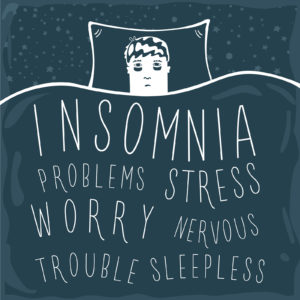What Every Troubled Sleeper Should Know About Insomnia
Getting enough restful sleep is very important for living a productive, healthy, and happy life. If you’ve ever experienced sleep deprivation, then you know what a large impact missing sleep can have on how you feel and how you live your life while you are awake. While occasional troubles with sleeping well are bound to happen to everyone, there are many people who suffer from ongoing Insomnia most nights of the week.
Each year, the first week of April is dedicated to increasing awareness about insomnia through National Insomnia Awareness Week. While this week is reserved to promote Insomnia awareness and encourage people suffering to seek treatment, many people do suffer from this sleep disorder throughout the year. For this reason, particularly if you are a troubled sleeper, it is important that you know the following things about Insomnia.
What is Insomnia?
According to the National Heart, Lung, and Blood Institute, Insomnia is a common sleep disorder that causes you to have trouble falling asleep, or staying asleep long enough to get the restful, rejuvenating sleep you need. There are two forms of Insomnia, acute and chronic.
Acute Insomnia
Acute Insomnia is common, and is typically triggered by events in your life that are causing stress, such as family, work, or relationships. Acute insomnia may last as little as a couple days, up to several weeks.
Chronic Insomnia
Chronic Insomnia occurs when you are unable to fall asleep, or have trouble staying asleep at night. Insomnia causes sleep issues several nights per week, for prolonged periods of time, and can have damaging effects on your life and health if not treated.
Causes of Insomnia
Occasional Insomnia can easily be brought about by increases in your stress level, but normal sleep should resume once the stress has been lessened or resolved.
However, prolonged bouts of Insomnia can be caused by other factors such as:
- Anxiety
- Medications
- Depression
- Medical Issues
- Caffeine, Nicotine, alcohol, or drug use
- Irregular sleep schedule and habits
Symptoms of Insomnia
Insomnia may negatively impact sleep in numerous ways, depending on the individual who suffers from this sleep disorder. According to the Mayo Clinic, the most common symptoms of Insomnia include:
- Difficulty falling asleep at night
- Trouble staying asleep long enough to get adequate rest
- Waking up too early, and not being able to go back to sleep
- Feeling unrested and unrefreshed when waking up in the morning
- Daytime drowsiness
- Anxiety, irritability, or depression
- Difficulty focusing attention
- Increased errors and mistakes at school or work
- Fatigue
- Frequent tension headaches and stomachaches
- Frequent worries about sleeping
Effects of Insomnia
Lack of sleep can have a very drastic impact on your waking life. Insomnia can decrease your productivity and performance at work or school, impair your judgement and decision-making skills, cause or aggravate health issues, cause depression, and lower the quality of your life.
Treatments for Insomnia
Once you have been diagnosed with Insomnia, common treatments for this sleep disorder include:
- Behavioral therapy
- Sleep habit improvements
- Identifying and treating underlying medical or emotional causes
- Sleeping medications
If you have been having troubles sleeping several nights a week, for a prolonged period of 3 months or more, than you could very well be suffering from the sleep disorder Insomnia. In order to diagnose Insomnia, you should contact a sleep expert and participate in a sleep study so you can reclaim your sleep, and live a well-rested life once more.


